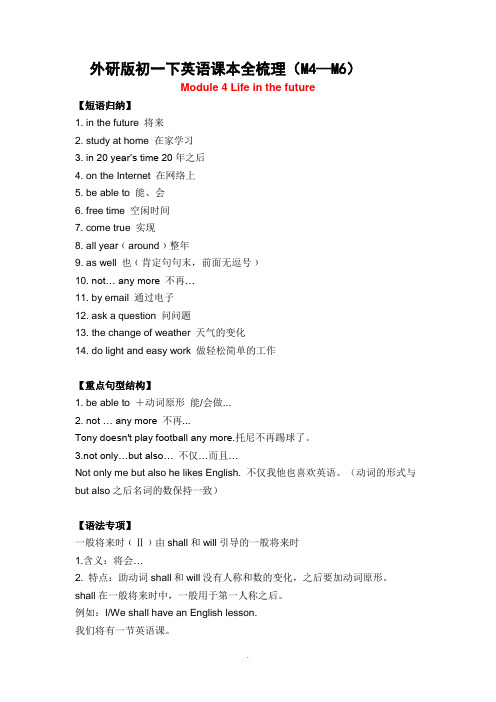外研版英语七年级下语法总复习
- 格式:pptx
- 大小:1.00 MB
- 文档页数:54

外研版七年级英语下册各模块语法知识汇总+专项练习M1 形容词性和名词性物主代词专项练物主代词分为两种:形容词性物主代词和名词性物主代词。
形容词性物主代词不能单独使用,后面必须跟名词,例如:We are doing our XXX(我们正在做家庭作业。
)名词性物主代词则具有名词的性质,可以单独使用,例如:My shirt is black。
but yours is white.(我的衬衫是黑色的,但你的是白色的。
)名词性物主代词也可以具有“形容词性物主代词+名词”的作用,例如:Whose comb is it。
It’s hers.(hers=her+comb)下面是物主代词的对照表:物主代词 | 形容词性 | 名词性 |我的 | my | XXX |你的 | your | yours |他的 | his | his |她的 | her | hers |它的 | its | its |我们的 | our | ours |你们的 | your | yours |他们的 | their | theirs |需要注意的是,名词性物主代词可指一件东西,也可指很多件东西,需要根据上下文来决定。
例如:选择填空:1.This is my teapot。
It’s not __________。
(your/ yours)2.My hairdryer is on the desk。
Where’s ____________?(her/ hers)3.___________ hairdryer is not on the table。
___________ is there。
(Her/ Mine)4.Whose calculator is it?It’s __________。
It’s __________ XXX)5.Are they ___________ (your/ yours) combs。
Yes。
they’re _________(our/ ours).用所给词的适当形式填空:1.That is not _________ kite。

外研版七年级下册英语重点知识点汇总Module 1 Lost and Found重点短语:1.失物招领箱:lost and found box2.小心:be careful with…3.从现在开始:from now on4.匆忙:XXX5.成百上千:hundreds of6.寻找(过程):look for7.首先:first of all8.找到(结果):find9.努力做某事(会成功):try to do sth10.从…中挑选:choose from11.试图做某事(成功与否未知):XXX12.此时此刻:XXX13.例如(用于列举):such as14.例如:for example重点句型:1.这是谁的 (XXX)2.帮助某人做某事:help sb do XXX.3.请小心保管…:XXX…4.欢迎来到…:e to +地点5.给某人打call sb at +电话号码语法总结:物主代词:表示所属关系的代词(…属于谁的)单数:人称形容词性物主代词名词性物主代词第一人称 my XXX第二人称 your yours第三人称 his hers its复数形容词性物主代名词性物主代第一人称 our ours第二人称 your yours第三人称 their theirs形容词性物主代词:必须和名词在一起,例如XXX,your XXX…名词性物主代词:相当于与之相对应的形容词性物主代词+名词,例如XXX.Module 2 What Can You Do?重点短语:1.与某人相处融洽:get on well with sb.2.弹钢琴:play the piano3.打乒乓球:play table XXX4.…怎么样?=how about…。
what about…5.担心…:XXX…6.擅长做某事:be good at doing sth.7.放风筝:fly a kite重点句型:无语法总结:无2.high-tech高科技的3.XXX虚拟现实4.XXX机器人仆人5.XXX太空旅行6.XXX可再生能源7.self-driving cars自动驾驶汽车8.ic engineering基因工程9.XXX寿命10.artificial intelligence人工智能重点句型】1.In the future。

七年级下册重点语法Module1语法:名词性物主代词肯定句结构:主语+can+动词原形+其他.否定句结构:主语+can’t(cannot)+动词原形+其他.一般疑问句:把can提前肯定回答:Yes,主语+can.否定回答:No,主语+can’t.一、用can,can’t填空1.What______youdo?Icanliftthisbox,butI______liftthatheavychair.2.______hereadChinese?——No,he______readChinese,buthe______readEnglish.3.______youstandinfrontofthedoor?ThenI______seeyou.4.______Pennywashthedishes?Yes,she______.5.I______seesomespoons,butI______seeanyknives.6.______acatdrinkmilk?Yes,it______.1.表示计划到某地去,谓语动词go与going重复,一般只说begoingto+地点..2.begoingto表示自己打算做某事,计划做某事或有意做某事3.will则表示对未来的猜测一、单项选择()1.There__________ameetingtomorrowafternoon.A.willbegoingtoB.willgoingtobeC.isgoingtobeD.willgotobe()2.Charlie________herenextmonth.A.isn'tworkingB.doesn'tworkingC.isn'tgoingtoworkingD.won'twork()3.He________verybusythisweek,he________freenextweek.A.willbe;isB.is;isC.willbe;willbeD.is;willbe()4.There________adolphinshowinthezootomorrowevening.A.wasB.isgoingtohaveC.willhaveD.isgoingtobe()5.-_____you______freetomorrow?-No.I_____freethedayaftertomorrow.(leave).-What______you____________(do)afteryou_________(leave)here?-I___________(return)homeand___________(get)ajob.3.I______(be)tired.I_____________(go)tobedearlytonight.4.Mary'sbirthdayisnextMonday,hermother_______________(give)herapresent.5.Itisverycoldthesedays.It______________(snow)soon.6.-_______you__________(be)herethisSaturday?-No.I___________(visit)myteacher.7.-____________I______________(get)youacopyoftoday'snewspaper?-Thankyou.8.Iamafraidthere____________(be)ameetingthisafternoon.Ican'tjoinyou.9.Mike______________(believe,not)thisuntilhe_________(see)itwithhisowneyes.10.Mostofusdon'tthinktheirteam_____________(win).Module5语法:特殊疑问句(相当于特殊疑问词加一般疑问句)一whattime,whatcolor,whatday,what填空。

(共12套73页)新外研版七年级英语下册(全册)知识点汇总语法知识汇总Module 1 Lost and found语法精选1. whose 谁的whose意为“谁的”, 是表示所有关系的疑问词。
其用法如下:(1)可以用来对名词所有格或形容词性物主代词进行提问。
如:This is Tina’s/her hat.→Whose hat is this?(2)可以用来对名词性物主代词进行提问。
如:These pencils are mine.→Whose are these pencils?2. hundred与hundreds ofhundred是一个确数, 表示“一百”;hundreds of是一个概数, 表示“好几百的;许许多多的”。
当 hundred前面有一个具体的数词时, hundred不变为复数。
如:①two hundred cows两百头奶牛②Hundreds of people come here ev ery day.每天都有许多人到这里来。
注意:当hundred与of连用时, 它后面的名词和它本身都用复数。
如:hundreds of cows 几百头奶牛3. such as 比如;例如such as意为“比如;例如”, 用于引出多个例子。
如:I like some animals such as lions and monkeys. 我喜欢一些动物, 比如狮子和猴子。
注意:for example也意为“比如;例如”, 用来举例说明某一论点或情况, 一般只举同类人或物中的“一个”为例, 作插入语, 可位于句首、句中或句末。
如:①For example, air is invisible.例如, 空气是看不见的。
②He, for example, is a good student.例如, 他就是个好学生。
③Many boys like playing basketball. Take me, for example.许多男孩喜欢打篮球。


外研版初一下英语课本全梳理(M4—M6)Module 4 Life in the future【短语归纳】1. in the future 将来2. study at home 在家学习3. in 20 year’s time 20年之后4. on the Internet 在网络上5. be able to 能、会6. free time 空闲时间7. come true 实现8. all year﹙around﹚整年9. as well 也﹙肯定句句末,前面无逗号﹚10. not… any more 不再…11. by email 通过电子12. ask a question 问问题13. the change of weather 天气的变化14. do light and easy work 做轻松简单的工作【重点句型结构】1. be able to +动词原形能/会做...2. not … any more 不再...Tony doesn′t play football any more.托尼不再踢球了。
3.not only…but also… 不仅…而且…Not only me but also he likes English. 不仅我他也喜欢英语。
(动词的形式与but also之后名词的数保持一致)【语法专项】一般将来时﹙Ⅱ﹚由shall和will引导的一般将来时1.含义:将会…2. 特点:助动词shall和will没有人称和数的变化,之后要加动词原形。
shall在一般将来时中,一般用于第一人称之后。
例如:I/We shall have an English lesson.我们将有一节英语课。
3.否定形式:shall not=shan′t will not=won′tModule 5 Shopping 【短语归纳】1. on Mother′s Day 在母亲节这一天2. what colour/color 什么颜色3. What about…? ...怎么样?4. try on 试穿5. look at… 看...6.too much 太多...(修饰不可数名词)7. wait a minute 等一会儿8. half price 半价9. pay for 为...付钱10. a few days later 几天后11. the price of… ...的价格12. one day 一天13. at any time 随时14. one of them 他们中的一个15. be able to 能/会...16. because of… 因为...17. online shopping 网络购物【重点句型结构】1.What′s the price of…? ...的价格是多少?2.buy sb sth. =buy sth for sb. 给某人买某物3.one of the+形容词最高级+可数名词复数最...之一one of the most famous writers 最著名的作家之一。
外研版英语七年级下册知识点总结外研新版英语七年级下册知识点总结Module 1 Lost and found1、lost and found 失物招领the lost and found box 失物招领箱2、(1) welcome back to 欢迎回到某地... Welcome back to school.(2) welcome to +地点的名词欢迎来某地Welcome to China.(3) Welcome 跟地点副词时不带to welcome home 欢迎回家Welcome here .(4) You are welcome. 不用谢。
(5) give sb. a warm welcome 热烈欢迎某人They gave a warm welcome to us.3、first of all 首先= at first / firstly (常位于句首作状语,强调首要的事情或动作)First of all, you should finish your homework.4、there be 句型中谓语动词采用就近原则There is some food in the fridge.5、a lot of =lots of 许多既可以修饰可数名词复数,也可以修饰不可数名词。
There is a lot of water in the glass. I have lots of books in my room.6、(1) look at 看(强调“看”的动作)Come and look at my new coat.(2) look (不及物动词,单独使用,用以引起对方的注意) Look! That’s an English car.(3) see 看见(及物动词,强调“看”的结果) Can you see the bird in the tree?(4) watch 观看,仔细地看(比赛、电视、戏等)They arewatching TV now.(5) read 看(书、报纸、杂志等) My mother is reading a book /a magazine /a newspaper.7、everyone/everybody 做主语,谓语动词用单数形式。
外研版七年级英语英语(下册)知识点归纳路漫漫其修远兮,吾将上下而求索。
第一模块:本模块主要介绍了一些常用短语和句型结构。
其中包括“失物招领箱”、“小心保管”、“从现在开始”、“首先”、“寻找”、“找到”、“努力做某事”、“从…中挑选”、“例如”等。
此外,还介绍了一些常用的语法专项,如物主代词的单数和复数形式等。
第二模块:本模块主要介绍了一些与爱好和运动相关的短语和句型结构。
其中包括“与某人相处融洽”、“弹钢琴”、“打乒乓球”、“担心”、“擅长做某事”、“放风筝”等。
此外,还介绍了一些常用的句型结构,如“做…怎么样”、“愿意做某事”、“承诺做某事”等。
改写建议:第一模块:这一模块介绍了一些常用的短语和句型结构,例如失物招领箱、小心保管、从现在开始、首先、寻找、找到、努力做某事、从…中挑选、例如等。
此外,还介绍了一些常用的语法专项,比如物主代词的单数和复数形式等。
第二模块:这一模块介绍了一些与爱好和运动相关的短语和句型结构,例如与某人相处融洽、弹钢琴、打乒乓球、担心、擅长做某事、放风筝等。
此外,还介绍了一些常用的句型结构,比如做…怎么样、愿意做某事、承诺做某事等。
The journey is long and arduous。
but I will XXX。
In terms of grammar。
it is XXX of using "your"。
"his"。
"her"。
or "its"。
it is best to use specific names or XXX。
Moving on to Module 3.some useful phrases include "have a ic"。
"check one's email"。
and "go over"。
外研版七年级下学期英语语法总结1、词类:物主代词、情态动词can与方位介词短语2、时态:一般将来时态与一般过去时态3、句型:特殊疑问句、祈使句、感叹句与选择疑问句一、物主代词1、物主代词:表示所属关系的代词(…属于谁的)2、形容词性物主代词与名词性物主代词的关系:(1)形容词性物主代词:必须与名词在一起。
My father, your teacher、、、(2)名词性物主代词:相当于与之相对应的形容词性物主代词+名词。
This shirt is mine、 =This is my shirt、二、情态动词can1、含义:表达人或物的能力,能或会、、、…2、特点:情态动词can没有人称与数的变化,之后要加动词原形。
3、否定形式:cannot(正式用法)=can’t(口语)4、句型结构:(1)肯定句:主语 + 情态动词 + 动词原形 + 其她 + 。
She / They can swim well、(2)否定句:主语 + 情态动词 + not + 动词原形 + 其她 + 。
She / They can not swim well、(3)一般疑问句: 情态动词 + 主语 + 动词原形 + 其她 + ?Can she / they swim well?Yes, she / they can、 / No, she / they can’t、(4)特殊疑问句: 特殊疑问词 + 情态动词 + 主语 + 动词原形 + 其她 + ?Why can she / they swim well?Who can swim well?三、介词between、、、and、、、在两者之间Lingling sits between Tony and Daming、玲玲坐在托尼与大明之间。
among 在三者或三者以上之间Miss Li is among lots of students、李老师在许多同学之间。
四、一般将来时1、时间状语:in+一段时间;tomorrow;in the future; next+时间;this+时间(表示将来时间的状语)2、 be(is,am、are) going to do的用法。